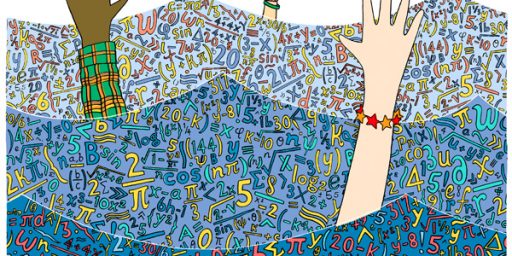Why Boys Lag Behind Girls in Reading
According to the Washington Post, the school system is discriminating against male students, holding them back in reading comprehension. Only in adulthood do males free themselves from the shackles of the matriarchical tyranny and assert their literary independence. At which point, in direct retaliation, they begin keeping women from blogging.
At least, that’s how I read it:
Educators Differ on Why Boys Lag in Reading
Enticing boys to read — and to keep reading — is the flip side of the sometimes fierce debate about girls and their math and science abilities, and both issues are receiving new attention as educators focus on how boys and girls learn differently. The controversy about gender and learning was stoked anew when Harvard University President Larry Summers recently questioned girls’ intrinsic abilities in math and science. Then first lady Laura Bush spoke about her new effort to help boys, who she said are falling dangerously behind girls in such areas as literacy.
Some educators have said that the concern over boys is exaggerated and that boys end up doing just fine, holding top jobs and being paid higher average salaries than women. Others, however, have said boys face an unprecedented literary crisis that limits their opportunities, citing studies showing that the gap between the sexes — dating back to the 19th century — has increased markedly.
“Part of it is biological and part of it is sociological, but boys are definitely drifting down,” said Jon Scieszka, author of the “The Stinky Cheese Man and Other Fairly Stupid Tales,” and founder of the Web site www.guysread.com, which is aimed at helping interest boys in reading. “We’ve been testing kids in America for the last 25 years and finding out that boys are doing worse than girls,” he said. “But we don’t do enough to change that.”
Exactly what should be done, however, is unclear, because there is no consensus on how much genetics, environment and culture are responsible for the gap. And it is not strictly a U.S. phenomenon: Stephen Gorard, education professor at the University of York in England, reviewed scores for 22 countries and discovered gaps in every one, despite differences in school setups and curricula.
That kind of bigoted, “boys will be boys” thinking is what keeps young males from achieving. Those who say they’re too busy playing sports and trying to impress girls to read a lot, or who say that the kinds of books that predominantly female English teachers pick for their students don’t interest boys, are just perpetuating the problem.






Well as the mom of four kids-two boys and two girls, I think part of the problem is there aren’t too many interesting books aimed at boys-the books expecially for the young readers tend to be more girl oriented (although part of this may be marketing-in that boy oriented books aren’t selling well, so they print what sells).
But my 7 year old happens to love reading, he just doesn’t like fiction very much, but give him an Atlas, or a book about China or Animals (all huge interests of his right now) and he will read them for hours.
JM, that sounds like me at that age.
God, I hope he turns out better than I did. 😉
I learned to read out of Detective Comics (Batman) and Action Comics (Superman) when I was so young I don’t remember not reading. Getting caught with those (or Rod&Custom or Famous Monsters magazines) in school resulted in punishment, despite which nearly fifty years later I am still hyperlexic.
James, I think you’re blaming the victims, here.
Somehow.
Well that explains why I hated English class in high school, particularly the years I had women as teachers.